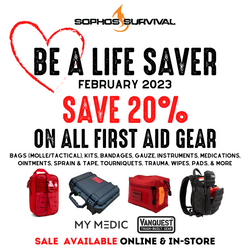BE A LIFESAVER THIS MONTH, NOT A HEARTBREAKER
Posted by Isaiah Price, Sophos Survival on 10th Feb 2023
In honor of (or ode to, however you feel about it) Valentine's Day, we are having fun focussing on first aid gear, supplies, and training.
For so many, Valentine's Day is a romantic and fun holiday to look forward to, and for others it's something to dread, avoid, and get it over with. For us here at Sophos Survival, we are here to STOP THAT BLEED and focus on heart health, first aid, and keeping all that blood INSIDE your body (98.2% of doctors agree - blood is most effective when it remains inside your body).
To celebrate, we are offering 20% off all first aid gear and supplies ALL MONTH. We are also doing a FREE STOP THE BLEED class here at our store in Spanish Fork, UT on Saturday, Feb 25th, 10-11am. JOIN US!
CLICK HERE TO GET THE DEAL ON OUR SITE
And now, a little about hearts, bleeding, signs & symptoms, and how to treat.
HEART ATTACK
(REF: Mayo Clinic)
WHAT IS IT?
A heart attack occurs when the flow of blood to the heart is severely reduced or blocked. The blockage is usually due to a buildup of fat, cholesterol and other substances in the heart (coronary) arteries. The fatty, cholesterol-containing deposits are called plaques. The process of plaque buildup is called atherosclerosis.
Sometimes, a plaque can rupture and form a clot that blocks blood flow. A lack of blood flow can damage or destroy part of the heart muscle.
A heart attack is also called a myocardial infarction.
SIGNS & SYMPTOMS
Symptoms of a heart attack vary. Some people have mild symptoms. Others have severe symptoms. Some people have no symptoms.
Common heart attack symptoms include:
- Chest pain that may feel like pressure, tightness, pain, squeezing or aching
- Pain or discomfort that spreads to the shoulder, arm, back, neck, jaw, teeth or sometimes the upper belly
- Cold sweat
- Fatigue
- Heartburn or indigestion
- Lightheadedness or sudden dizziness
- Nausea
- Shortness of breath
Women may have atypical symptoms such as brief or sharp pain felt in the neck, arm or back.
Sometimes, heart attacks strike suddenly and the first symptom is sudden cardiac arrest. But many people have warning signs and symptoms hours, days or weeks in advance. Chest pain or pressure (angina) that keeps happening and doesn't go away with rest may be an early warning sign. Angina is caused by a temporary decrease in blood flow to the heart.
TREATMENT (ADULT CPR)
(REF: EMS Safety)
If someone is unconscious and you think they're having a heart attack, do the following:
- Check for response and call 911
- Tap the victim's shoulder and shout to get their attention.
- If no response, yell for help. Send a bystander to call 911 and get an AED.
- If you are alone, call 911, place it on speaker and get the AED yourself.
- Check breathing
- Scan for breathing for 5-10 seconds.
- If no breathing or only gasping, start compressions.
- Provide chest compressions (30 compressions, 2 hands, firm and fast)
- Position face up on a firm, flat surface.
- Place hands on center of chest.
- Perform 30 compressions:
- DEPTH: At least 2 inches.
- RATE: 100-120 per minute.
- Open airway and give 2 breaths
- Tilt head back and lift chin to open airway.
- Pinch nose or apply a face mask.
- Give 2 rescue breaths for 1 second each.
- Watch for chest rise.
- Immediately resume compressions.
- Continue CPR (cycle 30 compressions and 2 rescue breaths) until EMS arrives and takes over.
- If an AED is available, use it as directed.
PREVENTION
It's never too late to take steps to prevent a heart attack — even if you've already had one. Here are ways to prevent a heart attack:
- Follow a healthy lifestyle. Don't smoke. Maintain a healthy weight with a heart-healthy diet. Get regular exercise and manage stress.
- Manage other health conditions. Certain conditions, such as high blood pressure and diabetes, can increase the risk of heart attacks. Ask your health care provider how often you need checkups.
- Take medications as directed. Your health care provider may prescribe drugs to protect and improve your heart health.
LEARN CPR so you can help someone who's having a heart attack. Take an accredited first-aid training course every 2 years to keep up on your skills, including CPR and how to use an automated external defibrillator (AED).
SEVERE BLEEDING
(REF: EMS Safety)
With severe bleeding, TIME IS CRITICAL. 30 seconds to three minutes may be all a person has, so stopping that bleeding must happen FAST.
With minor bleeding, a damaged blood vessel will constrict, blood will clot, and the bleeding will stop relatively easily. With heavy bleeding, the body cannot keep up and it can only be stopped with FIRM, DIRECT PRESSURE.
TREATMENT
(REF: EMS Safety)
- Expose the wound to see where the bleeding is coming from . If an object is embedded in the wound, do not apply pressure directly on the object.
- Apply firm, direct pressure with sterile gauze (or the cleanest cloth available - Let's be honest, in the moment you use what you have).
- Add dressings as they become soaked with blood. DO NOT remove soaked dressings. Maintain pressure.
- Treat for shock: if possible, lay victim flat and maintain body temperature.
- Once bleeding has stopped, apply a pressure bandage to secure dressings in place and maintain pressure.
- If bleeding cannot be stopped with pressure and a tourniquet is available, use it!
- Get this person to a hospital!
- Call 911 if:
- Bleeding is severe and does not stop
- Signs of internal bleeding or shock
- Suspected head, neck, or spine injury
- Get proper training on the use of pressure bandages and tourniquets.
Final thoughts... You cannot plan for an emergency, put you can prepare for one. What I mean is that we never know when an emergency like a heart attack will happen, and when it happens, it's too late to prepare. If we prepare ahead of time by getting the supplies and equipment we need, GET TRAINING and practice our skills, we will fall back on that training when the moment counts.
Knowledge is power. The name of our company (SOPHOS) means WISDOM in Greek. When something intense, traumatic, or scary happens, we will not magically rise to the occation and become a hero if we don't have the training, practice, and muscle memory. We will panic, freeze, or do something stupid that makes the situation worse.
Get trained, save a life.

